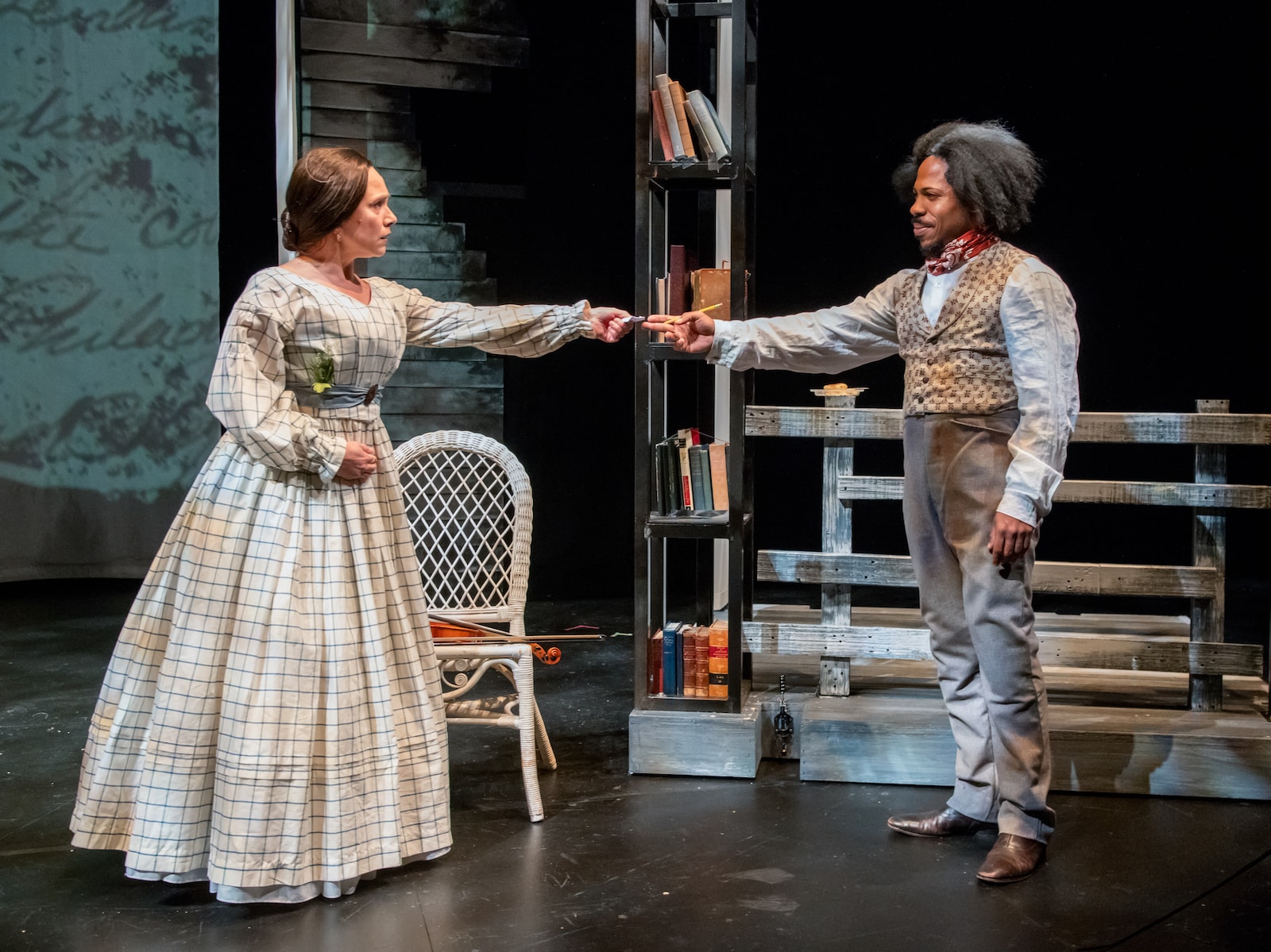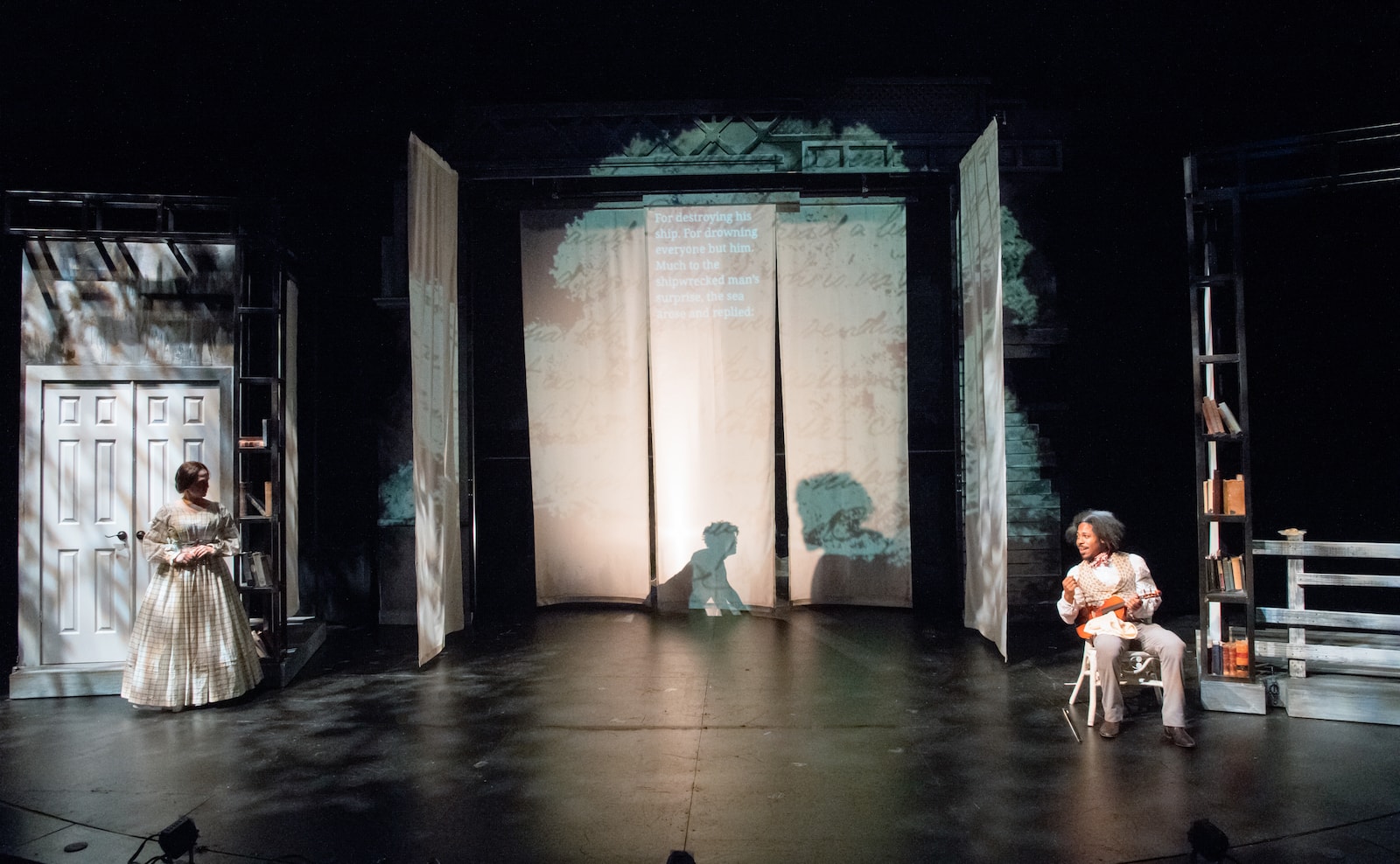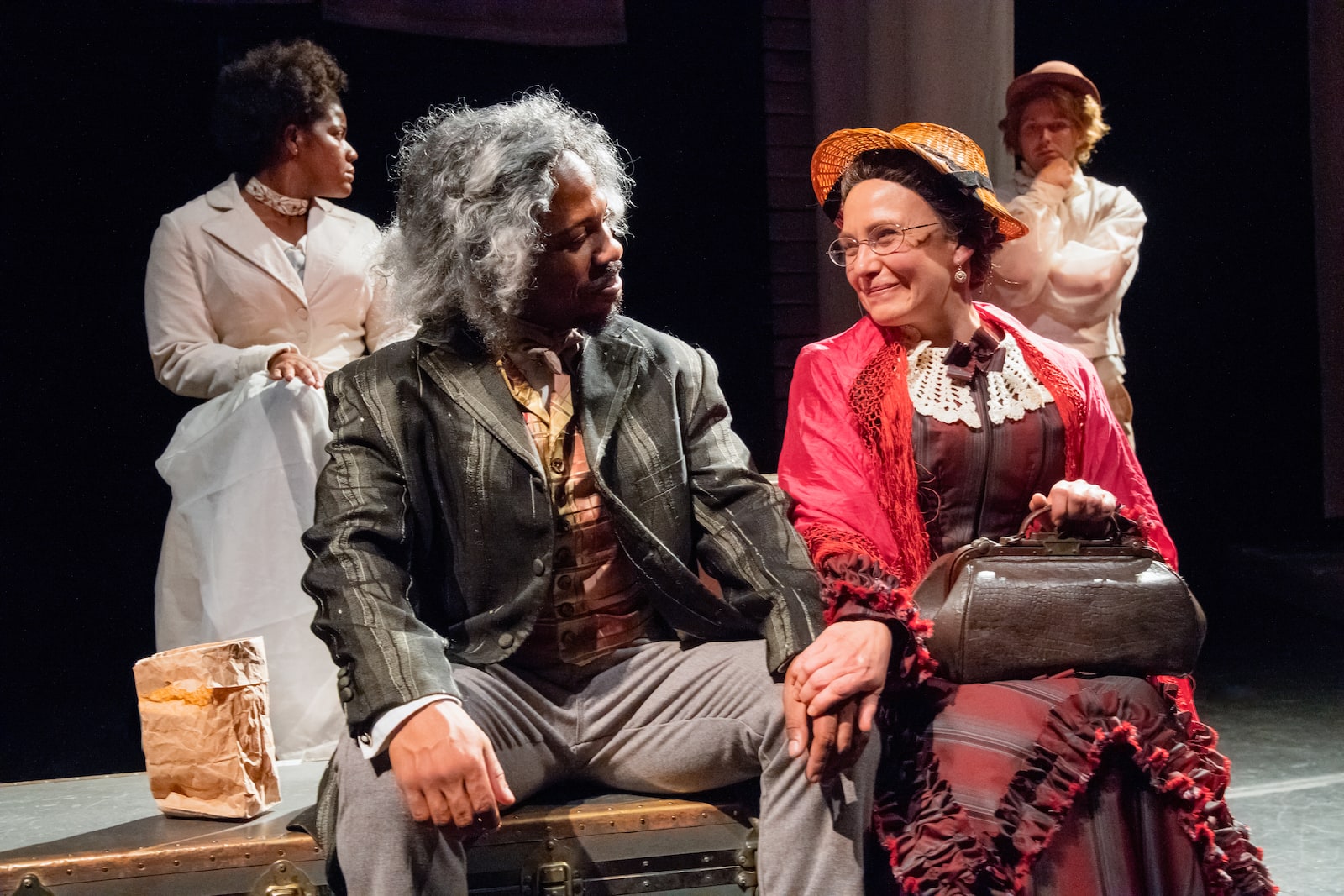“Do you still believe there can be a country for all?”
When that blunt question comes up in The Agitators—Mat Smart’s deeply affecting play about the friendship between Susan B. Anthony and Frederick Douglass—one almost has to catch one’s breath. For that question not only challenged those two great justice fighters; it is the question that tests our nation still.
In Mat Smart’s powerful telling, what goes down between Susan B. Anthony and Frederick Douglass goes way beyond bio-drama. Here we see two noble seekers of equality and hear heartstrings of the history they left unfinished.

Some may already know in outline the play’s reality-based plot: In life, Anthony and Douglass were family friends. They made common cause in the Abolition movement, having come to it from different standpoints. She was white, a Quaker. He was black, an escaped slave. What mattered was not whether they abhorred slavery for the same reason; what mattered was ending it. So it was that in their shared passion for equality—and in mutual regard of their respective gifts as writers, orators, and agitators—they forged an uncommon friendship.
After the Civil War ended slavery, Anthony and Douglass turned their attention to what both hoped would be universal suffrage. Their allyship was fractured, however, over the 15th Amendment, which would enfranchise only black men, and neither white nor black women. Douglass, from his standpoint as a black man, advocated for the amendment, believing it a more achievable objective than voting rights for women. From her standpoint as a woman, Anthony was betrayed, and their political falling out was bitter. He accused her of accepting funding from a racist; she accused him of accepting funding from a misogynist. They stopped communicating. But after the 15th Amendment passed, Douglass dedicated himself to agitating for women’s suffrage shoulder to shoulder with Anthony. They kept at it the rest of their lives. Their friendship and appreciation of each other resumed. (Women finally got the vote long after both had died.)
But don’t come expecting an archival costume pageant. The production of The Agitators now playing at Mosaic, under the wildly imaginative direction of Kenyatta Rogers, is a rapturous mashup of musical and staging styles that blows the dust off history like there’s no yesterday.

The eclectic incidental music includes such period tunes as “Song of the Abolitionist” then fast-forwards to “It’s a Man’s World” and “Sisters Are Doing It for Themselves,” along with orchestral instrumentals, violin solos, rap, and more. Some scenes even take place as shadow plays, dance, and quasi Kabuki. The entire show is a visual and aural astonishment.
Sound Designer David Lamont Wilson fills the house with effects so virtuosically intense—pounding heartbeats, screeching train—that they achieve the stature of another character in the play. Set Designer Jonathan Dahm Robertson devises two mobile units, one for each principal’s study, that join to be other places. The action is framed by a gray bas-relief proscenium, and from everywhere hang billowing sheer white panels like diaphanous dustcovers. Lighting Designer Alberto Segarra deftly deploys old-time footlights along with eye-popping strobes. And Projections Designer James Morrison animates the display with locomotive steam, flames, and captions for the Deaf and hard of hearing.
As written and performed, both leads are personable and at the same time imposing, easily code-switching to their iconic characters’ rhetoric. Ro Boddie plays a robust Douglass, down to earth in daily life yet capable of delivering Douglass’s elevated diction with exhilarating verve. Marni Penning plays a genteel, genial Anthony, less stern than one would suppose from photos, and somewhat given to melodrama. But when she chides Douglass for his paternalistic treatment of his wife Anna (who never learned to read), her spot-on reproof meets a murmur of approval from the audience. Though the two are not quite evenly matched in stage stature—one can better picture Boddie’s bold Douglass galvanizing a crowd on the lecture circuit than one can imagine Penning’s circumspect Anthony giving such a speech—the two are absolutely each other’s equal in convincingness of conscience. When Douglass urges Anthony, “Use your words as weapons for moral change,” Boddie and Penning leave no doubt their characters both know what depth of conviction it takes to do so.
Costume Designer Amy MacDonald renders Anthony’s and Douglass’s wardrobes with a fascinating subtext to the play: the very unequal freedom in garments worn by women and men at the time. MacDonald gives Douglass dapper shoes, slacks, and waistcoats that Boddie can stride about in effortlessly. Anthony’s heavy floor-length gowns, by contrast, have so many restrictive underlayers that Penning sometimes appears less attired than upholstered. One cannot help but be impressed that Anthony traveled from town to town so weighted down and overdressed.

Rogers adds an ensemble of two actors not originally in the script, Adanna Paul and Josh Adams, who sometimes appear as mentioned characters (Paul as Douglass’s dutiful wife Anna, Adams as a menacing white man), sometimes shove set pieces around, sometimes dance to Elena Velasco’s expressionistic choreography. They are a pleasant presence.
The Agitators brings home one of the most emotionally fraught contradictions in the cause of social justice: What is the tradeoff when one pursues a tactic that doesn’t completely live up to one’s ideals? (“Equality piece by piece” Douglass calls it.) What is the cost of never compromising on principle if that means never getting anything done? Douglass makes the point by telling Stanton a fable a la Aesop about a huge oak tree that is felled in a storm while willowy reeds that bend in the wind survive.
Even more movingly, The Agitators asks whether this can ever be a country for all by asking the underlying question: Will Americans ever have the united strength to fight in the interests of one another as much as we fight in the interest of ourselves?
Incisively linking America’s past and present through two monumental lives, The Agitators propels us as citizen theatergoers into the pulsing and problematic heart of our still-far-from-perfect union. What Mosaic Theater has achieved here is purpose-filled playmaking at its finest. It shows not only then. It illuminates now.
Running Time: Two hours 15 minutes, including one intermission.
The Agitators plays through November 25, 2018, at Mosaic Theater Company performing at the Atlas Performing Arts Center, Lang Theatre – 1333 H St NE, Washington, DC 20002. For tickets, call the box office at (202) 399-7993 ext 2 or purchase them online.
During every performance of The Agitators, captions showing dialog and descriptions of the sound design will be projected on the set for the Deaf and hard of hearing.





Beautifully written